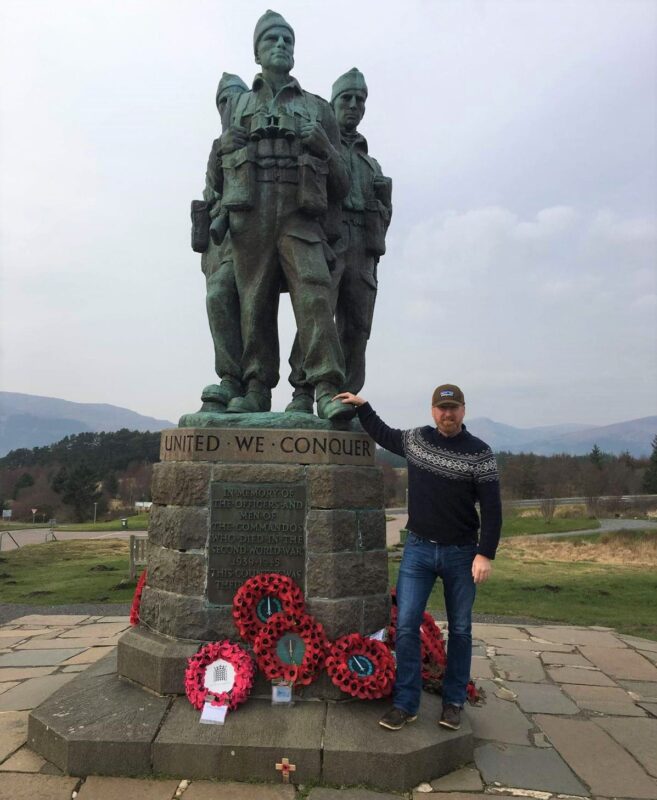Helping Police Personnel to Go Always A Little Further
Rendel Ish is instrumental to Pilgrim Bandits’ Curtis Palmer Programme. Established in early 2019, the Programme helps Police Officers with injuries, or who are struggling with their mental health, to get back to work in a better place.
The Programme includes physical challenges and expeditions, emotional intelligence and wellbeing training, and mentoring by injured military servicemen who have encountered and overcome similar trauma.
Rendel Ish recently won the Thames Valley Police Federation Inspiration Award for his work. He shares his passion for the Curtis Palmer Programme and why he became involved:
“I left the military after just under eight years’ service in 1999 and joined the Police. My time in the military had been really positive and I was lucky enough to have travelled all over the world. I was involved in the Hong Kong handover; I’d been to Norway numerous times, to Bosnia and to Canada. I was one of the first British forces into South Africa after the fall of Apartheid.
“But it wasn’t really a time of conflict. When I left the Armed Forces, a number of my friends stayed on and sadly some of them were killed in conflict shortly afterwards. One of my close friends, who I trained with to break the World Record for the Military Marathon, was a lad called Llewellyn Evans and he was killed in Gulf War 2. His death had a big impact on me as he was younger than me and in my view a better man. I had other friends who died in Afghanistan.
“I think I had some survivor’s guilt element and felt guilty that apart from Bosnia I’d seen no active service and certainly nothing like Afghanistan. I wanted to give something back and help others who had given so much more than me. I applied to go on an expedition with Pilgrim Bandits about nine years ago, retracing the route of the Telemark Heroes in Norway.
“I became a Trustee of the Charity and went on a number of expeditions with them: canoeing 500 miles down the Yukon River in Canada; cycling across New Zealand, retracing the route of the Cockleshell Heroes. I saw the benefits that it brought military veterans and I wanted to extend that help to the Police Force.
“I’ve seen Police Officers who have been in car accidents, officers that have been seriously assaulted and officers that have sustained life changing injuries. Post-Traumatic Stress Disorder (PTSD) is also a big issue in the Police Force.
“Police Officers are constantly exposed to negative contact and they’re involved in some really traumatic situations. It might be investigating a child pornography case and having to watch hours and hours of video tape. Or you might be an officer who goes to fatal car crashes, or has to be first on scene at a terrorist incident, or has to go and tell someone’s parents that their son has committed suicide.
“These kinds of situations of course have an impact either individually or through repeated exposure to it. Stress and PTSD are the biggest causes of workplace sickness across all Police Forces. It’s the number one reason for staff being off work. As well as the toll this takes on individuals, this also costs Police Forces millions of pounds that could be redirected to fight crime, prevent crime or protect our communities.
“We created the Curtis Palmer Programme to help. In 2019 I resigned as a Trustee and became the National Police Lead for the Curtis Palmer Programme. Pilgrim Bandits is getting Police Officers and Police staff back out there in a much better place so that they can attend the burglary, they can respond to that report of a suspicious person in a better state of mind enjoying the job that they perhaps had fallen out of love with. Importantly it doesn’t cost the Police Force or the individual referred anything to enrol with the CPP as we have secured funding from numerous sources including the National Lottery.
“We’ve had over 35 students from seven different Police Forces on the Curtis Palmer Programme already since it began a year ago. All of the students have completed the short free Open University courses in mindfulness or emotional intelligence that we have referred them to. The process has led to helpers gaining promotion – and students gaining different departmental jobs that they sought and some of these people were thinking of leaving the Police.
“The Programme offers instructor training, so that students who progress can help us with future courses. It’s a 360 degree recovery process: those that needed help become the ones who give it. That’s why we’re also encouraging students of the Programme to give talks about their experiences and their recovery process.
“Sharing is a real focus: if you share your journey, you might prevent someone else from needing to go on a similar journey themselves.
“For me, the expeditions give students the opportunity to escape from work/life pressures and they put your problems into perspective. We allocate the pairings really carefully. For example, when we’re doing a canoeing expedition, we pair someone with PTSD with a double amputee.
“A lot of our injured amputee veterans don’t suffer with PTSD. They have the mindset of ‘I’m a survivor, I’m just happy to be alive.’ Spending a week together, helping each other and navigating one another’s needs as they put up the tent, make dinner, is a healing process for both of them. They recognise that they’re helping each other, recognise their worth and their ability to contribute and still be a part of the team.
“It’s something that people can be involved with for as long as they want to be. There isn’t a cut-off point and I think that’s also true of PTSD. I don’t think it ever leaves you. You might be in control of it, but it’s always there.”

